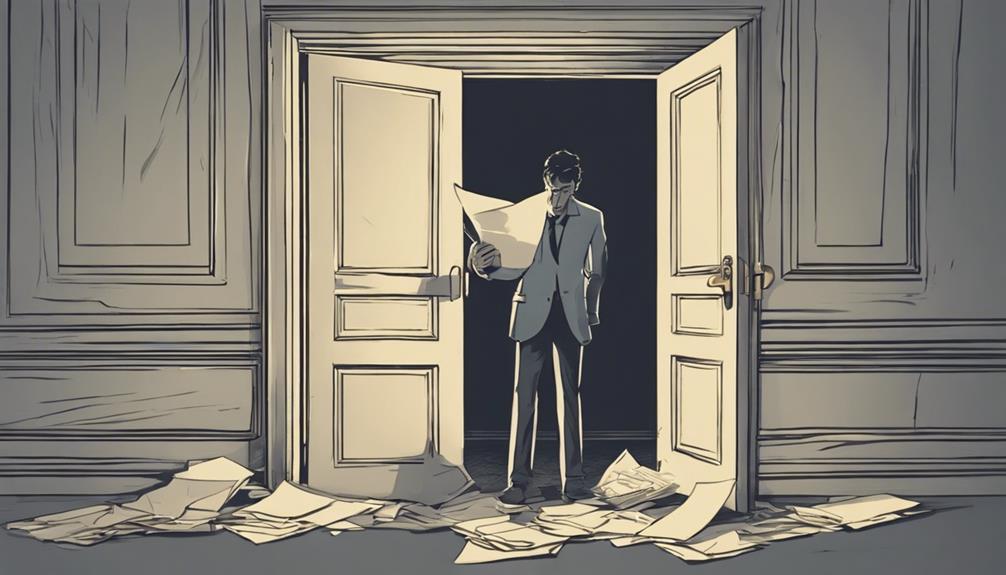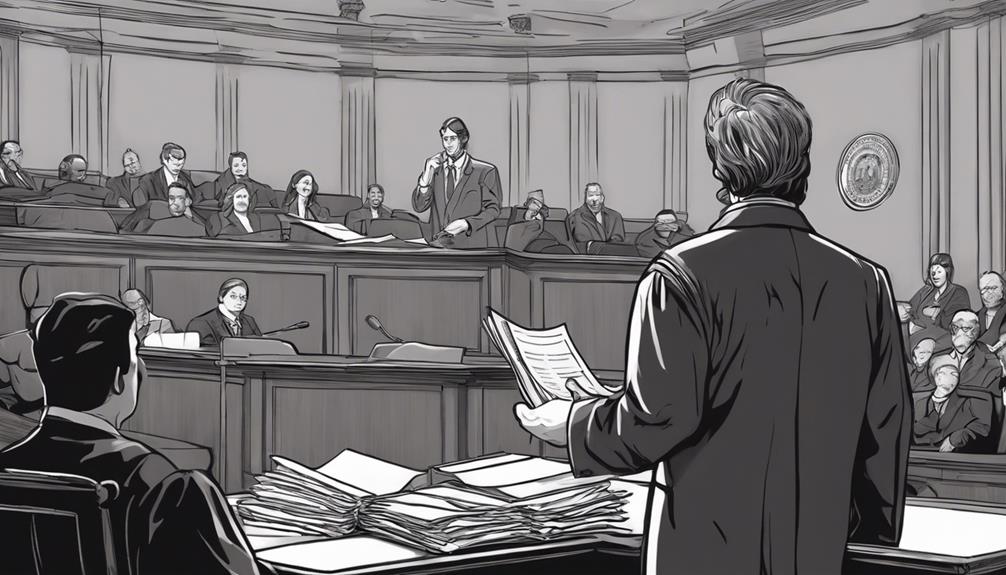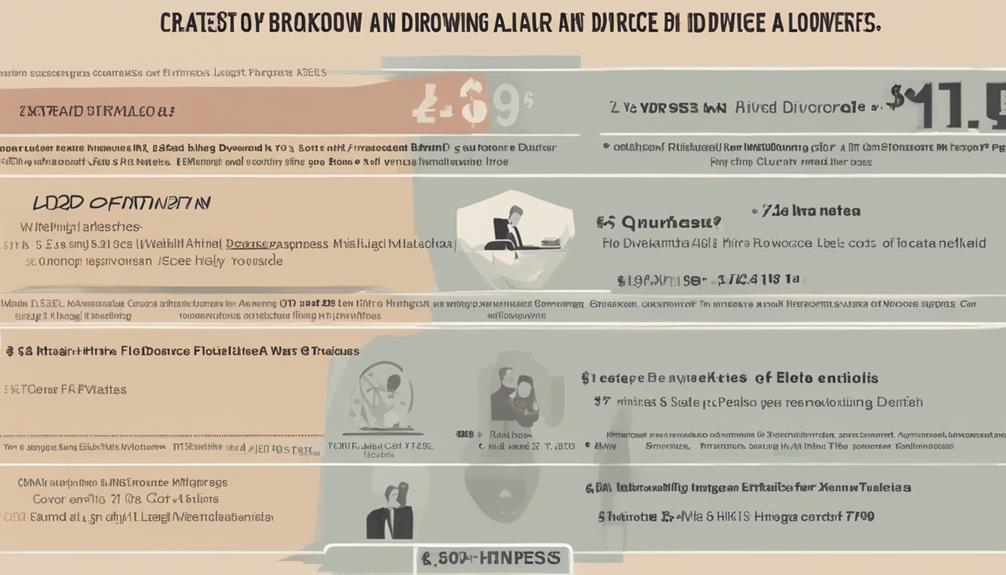Navigating the Divorce Process
7 Steps to Get a Divorce When the Other Party Refuses
Muster your strength and discover seven strategic steps to overcome obstacles when your spouse refuses to cooperate in a divorce – find out how!

As we navigate the complexities of divorce, we often encounter hurdles that test our resilience and determination.
Imagine finding yourself in a situation where your spouse adamantly refuses to cooperate in the divorce process, stalling the proceedings and causing frustration.
In such challenging circumstances, it becomes imperative to understand the steps one can take to move forward and secure a resolution.
By exploring strategies like consulting with legal experts, pursuing mediation, and seeking court intervention, individuals can gain insights into how to maneuver through a divorce successfully, even in the face of opposition.
Key Takeaways
- Consulting experienced attorneys ensures proper legal guidance and protection of rights.
- Initiating legal steps, including default judgment if needed, is crucial.
- Consider mediation for cost-effective resolution and control over outcomes.
- Enforce court agreements with legal remedies if the spouse is uncooperative.
Understanding Your Legal Rights
Understanding your legal rights is essential when facing a situation where your spouse refuses to cooperate in the divorce process. When a spouse refuses to sign divorce papers, it can create challenges, but it doesn't necessarily halt the proceedings. Knowing your legal rights empowers you to take the necessary steps to move forward with the divorce even in the face of uncooperative behavior.
In such circumstances, seeking guidance from a knowledgeable divorce attorney is crucial. A legal professional can help you navigate the complexities of the situation and provide strategic advice on how to proceed. By understanding the legal procedures in place to address a spouse who refuses to sign, you can initiate the required legal steps confidently.
Consulting With an Attorney

When faced with a situation where the other party refuses to cooperate in a divorce, seeking legal counsel is vital. An attorney can provide the necessary expertise to navigate the complexities of the legal process and protect your rights.
Consulting with a lawyer is a crucial step in understanding your options and ensuring you're well-informed and supported throughout the divorce proceedings.
Legal Advice Importance
Seeking guidance from an experienced attorney is essential when navigating the complexities of a divorce, ensuring your rights and interests are protected throughout the process. Legal professionals play a crucial role in helping individuals understand their rights and responsibilities in court proceedings, especially when dealing with a spouse's refusal to sign divorce papers.
By consulting with an attorney, you can effectively address any legal challenges that may arise, ensuring the best course of action is pursued. Attorneys not only provide guidance but also safeguard your interests and assets during the divorce process, offering strategic advice to help you achieve a favorable outcome.
Trusting in the expertise of a legal professional can make a significant difference in handling the legal aspects of your divorce effectively.
Expert Guidance Essential
For optimal guidance and support in navigating a divorce where the other party refuses to cooperate, consulting with a seasoned attorney is a pivotal step towards ensuring your rights and interests are safeguarded. When dealing with a spouse who's refusing to sign divorce papers, an attorney can provide essential legal guidance, help you understand your rights, and advise on the best course of action.
Legal representation is crucial to address the spouse's refusal and protect your interests during the divorce process. Attorneys can assist you in pursuing a default judgment and navigating the legal implications of proceeding without the spouse's consent. Seeking professional legal assistance ensures that you have the necessary support and expertise to handle a challenging divorce situation effectively.
- Obtain legal guidance to understand rights.
- Address the spouse's refusal with legal representation.
- Pursue a default judgment through an attorney.
- Protect your interests during the divorce process.
Lawyer Consultation Necessary
Navigating a divorce where the other party refuses to cooperate requires the essential step of consulting with a seasoned attorney to ensure your rights and interests are protected.
A divorce attorney can provide valuable insights on how to address a spouse's refusal to sign divorce papers, guiding you through the best legal course of action.
By seeking professional legal assistance, you can safeguard your interests and navigate the complexities of divorce proceedings effectively.
With the expertise of a divorce attorney, you can work towards achieving a fair outcome and ensuring that your rights are upheld throughout the process.
Trusting in legal counsel can be instrumental in addressing the challenges posed by a non-cooperative spouse and moving forward towards a resolution that serves your best interests.
Filing a Petition for Divorce

When filing a petition for divorce, it's crucial to ensure all required legal forms are completed accurately. The court filing process marks the official beginning of the legal procedures to dissolve the marriage.
Properly serving the petition on the spouse is essential to notify them of the divorce proceedings.
Required Legal Forms
To file for divorce in Texas, the initial step involves completing and filing the Petition for Divorce, a crucial legal form outlining the grounds for divorce and desired outcomes. The Petition for Divorce must contain detailed information about the marriage, children, assets, and requested relief. Here are essential points regarding the required legal forms:
- Include specific details about the marriage, children, assets, and requested relief in the Petition for Divorce.
- Filing the Petition officially starts the divorce process and informs the court of the intent to dissolve the marriage.
- Properly complete, sign, and file the Petition with the appropriate court to initiate legal proceedings.
- Serving the spouse with the filed Petition is necessary to provide legal notice and allow for a response.
Court Filing Process
Starting the divorce process with the court filing involves submitting a petition outlining the grounds for divorce and requested relief. It is crucial to serve your spouse with the divorce papers correctly, ensuring they are aware of the legal proceedings. If your spouse refuses to sign the divorce papers or does not respond to the divorce petition within the specified timeframe, you may need to take further legal action. Filing a motion for default judgment can be an option in cases of contested divorce where the other party is uncooperative. This legal step allows the court to proceed with the divorce process even if your spouse is not actively participating. Below is a table outlining key steps in the court filing process:
| Step | Description |
|---|---|
| File Petition for Divorce | Begin the process by submitting a petition outlining grounds for divorce. |
| Serve Your Spouse | Ensure proper service of divorce papers to notify the spouse of the action. |
| Respond to the Divorce | Respondent spouse has a timeframe to reply; consider filing a default motion. |
| Default Judgment | In cases of unresponsive spouses, seek a default judgment for the divorce. |
Exploring Mediation Options

Considering mediation for your divorce can provide a constructive path towards resolving disputes amicably and efficiently. Mediation involves a neutral mediator facilitating discussions between parties to reach agreements. Here are some key points to consider when exploring mediation options:
- Voluntary Process: Mediation is a voluntary process where parties can openly discuss issues with guidance from a neutral mediator.
- Comprehensive Solutions: It allows couples to address various aspects of divorce, including child custody, asset division, and spousal support, in a holistic manner.
- Cost-Effective and Confidential: Mediation is typically less costly than court proceedings and maintains confidentiality throughout the process.
- Promotes Cooperation: By fostering cooperation and communication, mediation can lead to long-term solutions that benefit both parties.
Through mediation, you can work towards mutually satisfactory resolutions while maintaining more control over the outcome. It can be a valuable tool in navigating the complexities of divorce and moving forward positively.
Seeking Default Judgment

When mediation fails to yield an agreement, seeking a default judgment in a divorce case can be a necessary step to progress the legal proceedings.
In situations where a spouse refuses to sign or participate in the divorce process, a default judgment allows the court to move forward with the case.
To request a default judgment, the party seeking it must ensure proper service of process of the divorce petition to the other party. This involves providing evidence to the court that the necessary legal documents were delivered correctly.
A default judgment may be particularly useful in cases of domestic violence or when the other party is uncooperative or unreachable. It empowers the court to make decisions regarding property division, child custody, and support without the direct input of the non-responsive spouse.
Seeking a default judgment is a strategic legal option when faced with a spouse who refuses to engage in an uncontested divorce.
Enforcing Court Agreements

Enforcing court agreements in divorce cases requires strict adherence to legal obligations and proactive measures to ensure compliance. When dealing with a party refusing to follow court agreements, it's crucial to understand the available options for enforcement. Here are key steps to enforce court agreements effectively:
- Understand the enforceability: Court agreements are legally binding, and failure to comply can lead to penalties or contempt of court charges.
- Seek legal remedies: If one party refuses to adhere to the agreement, pursuing legal remedies through the court system may be necessary.
- Consider a motion for enforcement: Filing a motion for enforcement can prompt the court to take action to ensure compliance with the agreement.
- Consult with an attorney: Seeking guidance from a knowledgeable attorney can help navigate the enforcement process and determine the best course of action to enforce court agreements effectively.
Finalizing the Divorce Process

To navigate the process of finalizing a divorce when faced with a resistant party, understanding the legal options available is essential for achieving a resolution. When a spouse won't sign divorce papers, seeking a default divorce judgment after a waiting period can be a strategic move. It's important to be aware that in certain states, like Texas, a spouse's signature may not be a requirement for finalizing a divorce, allowing the process to proceed even if the other party refuses to sign. Consulting with an attorney is highly recommended to ensure that the necessary steps are taken towards finalizing the divorce. Additionally, considering a neutral third party to assist in the negotiation process can be beneficial. The table below outlines key steps and considerations for finalizing the divorce process when a spouse won't sign the papers:
| Step | Description |
|---|---|
| File for Divorce | Initiate the legal process by filing a petition. |
| Seek Default Judgment | Proceed with the divorce if the spouse refuses to sign. |
| Attend Final Hearing | Finalize the divorce with or without the spouse's consent. |
Frequently Asked Questions
What Happens When One Spouse Doesn't Want a Divorce?
When one spouse doesn't want a divorce, legal avenues exist to navigate this situation. Understanding available options and following proper procedures can facilitate the divorce process despite one party's reluctance. We guide you through this challenge.
Who Loses More Financially in a Divorce?
In a divorce, financial losses can vary based on income, assets, and support agreements. The spouse with higher earnings or more assets may face greater losses. Alimony and asset division impact outcomes. Consulting professionals can mitigate losses.
How Do You Deal With Divorce When You Don't Want It?
Dealing with divorce when you don't want it can be challenging. We recommend seeking emotional support, legal advice, and exploring options like mediation. Understanding your rights and responsibilities is crucial to navigate this difficult situation effectively.
What Are the Stages of Divorce for a Woman?
When a woman initiates divorce, she files a petition, serves papers, awaits response, and may seek default judgment if needed. The court then issues a decree finalizing the terms. Each stage requires patience and legal understanding.
Conclusion
In conclusion, navigating a divorce when the other party refuses to cooperate can be challenging, but with the right guidance and legal support, it can be manageable.
Remember, Rome wasn't built in a day, and neither is a divorce finalized overnight. Stay strong, stay focused, and trust in the process to protect your interests and move forward towards a brighter future.
You've got this!
Allison is the driving force behind our content, ensuring that every piece of information we share is both empowering and insightful. With a keen eye for detail and a deep understanding of the divorce process, Allison curates content that speaks directly to the needs of our audience. Her expertise ensures that How Get Divorce remains a trusted and authoritative source of guidance for those navigating the difficult waters of divorce.
Navigating the Divorce Process
How to Get Your Attorney Fees Paid in a Divorce
In navigating divorce, understanding how to secure payment for attorney fees is crucial, but what happens if you miss a critical step?

Navigating through the intricacies of divorce, making sure you have your legal fees covered is an essential component of the process. For example, in some areas, like Texas, it’s crucial to incorporate a formal plea for the payment of fees in your initial divorce filing.
But what happens if this step is overlooked or not done correctly? Understanding the underlying principles and legal strategies that influence the payment of attorney fees in a divorce can significantly impact the outcome of your case.
Let's explore the nuances of getting your attorney fees paid in a divorce and the strategic approaches that can help secure financial assistance for legal representation.
Key Takeaways
- Request interim attorney fees based on financial need during divorce.
- Judges can order fee payments from community assets or spouse's income.
- Discuss financial situation openly to negotiate fair attorney fee payment.
- Consider alternative payment sources like selling assets or incurring debt.
Legal Options for Attorney Fees
When facing the financial burden of attorney fees in a divorce, understanding the legal options available is crucial for securing fair representation. In a community property state like Texas, spouses may be entitled to have their attorney fees paid from community assets.
Interim attorney fees can also be requested during the divorce proceedings to ensure both parties have access to legal representation. It's essential to seek legal assistance to navigate the complexities of these financial matters.
Judges have the authority to order payment of attorney fees based on the ability to pay from community assets. They carefully assess the reasonableness of the fees requested and may order payment from various sources. Methods to pay one's spouse's attorney fees can include making periodic payments from income, selling nonliquid property, or even incurring debt if necessary.
Ensuring that attorney fees are addressed promptly and fairly is crucial, especially in cases involving child custody where legal representation is vital for protecting one's rights.
Factors Influencing Fee Payment

Considering the financial dynamics at play in a divorce, various factors come into play when determining the payment of attorney fees, with the court weighing the financial standing of both parties as a critical influencer in the decision-making process. In Texas, attorney fees are considered community property until the divorce is finalized. Interim fees can be requested during the ongoing divorce process based on financial need. It's crucial to note that bad faith actions like hiding assets or non-compliance with court orders can lead to one spouse being responsible for paying the other's attorney fees. Additionally, judges may order one spouse to pay the other's fees to ensure equal access to legal representation. Fairness and equal representation are significant considerations for the court when making payment determinations regarding attorney fees in a divorce. Below is a table summarizing the key factors influencing fee payment:
| Factors | Influence on Fee Payment |
|---|---|
| Financial Status | Critical consideration |
| Bad Faith Actions | Responsibility for fees |
| Interim Fees | Based on financial need |
| Equal Representation | Ensuring fairness |
| Court Orders | Compliance importance |
Financial Considerations and Strategies
Understanding the financial implications and implementing effective strategies play a crucial role in navigating the payment of attorney fees during a divorce. It's important for both spouses to consider the financial status of each party when requesting payment of attorney fees.
In the legal realm, judges have the authority to order one spouse to pay the other's attorney fees based on just and right division principles. Temporary fees can be sought through a Motion for Interim Attorney Fees to cover ongoing legal costs. Spouses may need to provide justification for the reasonableness of the fees requested by their attorneys.
Exploring alternative payment sources, such as selling nonliquid assets or incurring debt, can be viable strategies to cover attorney fees during the divorce process. By being mindful of the financial aspects and leveraging available legal options, both parties can work towards a fair resolution in the payment of attorney fees.
State-Specific Laws and Resources

Navigating the intricacies of divorce laws and available resources in your state can significantly impact the outcome of attorney fee payments. In Texas, understanding the state-specific laws related to attorney fees is crucial for a successful divorce process. Here are some key points to consider:
- Attorney fees: In Texas, attorney fees can be requested in the original petition for divorce.
- Financial status: Texas courts take into account the financial status of both parties when determining attorney fee payments.
- Income disparity: Judges may order one spouse to pay the other's attorney fees in cases of significant income disparity.
- Bad behavior: Engaging in bad behavior during the divorce process, like hiding assets or not complying with court orders, can result in paying the other party's attorney fees.
- Interim fees: Interim attorney fees can be requested to ensure legal representation for both parties throughout the divorce process.
Understanding these nuances can help you navigate the legal landscape effectively and secure fair attorney fee payments in Texas courts.
Negotiating Attorney Fees Efficiently
Let's smoothly shift our focus to efficiently negotiating attorney fees by strategizing smartly and communicating effectively during the divorce process. When dealing with attorney fees, it's crucial to discuss your financial situation openly with your legal representative to assess if your spouse can be held accountable for covering these costs. Providing evidence of your spouse's higher income or financial advantage can strengthen your case for them to pay your attorney fees. Negotiation plays a key role here; aim to reach a mutual agreement with your spouse or their attorney on sharing or covering the attorney fees to prevent court intervention. Be ready to justify the reasonableness of the fees and expenses incurred during the process. If your spouse is unwilling or unable to cover these costs, explore alternative payment arrangements like selling assets or securing a loan. Efficient negotiation is the cornerstone of getting your attorney fees paid in a divorce.
| Efficient Negotiation Tips | |
|---|---|
| Discuss Financial Situation | Provide Evidence of Spouse's Higher Income |
| Negotiate with Spouse | Justify Attorney Fees & Expenses |
| Consider Alternative Payments | Avoid Court Intervention |
Frequently Asked Questions
Who Loses the Most in a Divorce?
In a divorce, the spouse with higher income or more assets may bear more legal fees. Financial disparities impact who shoulders expenses. Court decisions consider income and assets. Fair representation access involves financial need and conduct influences fees responsibility.
Can My Spouse Make Me Pay Her Divorce Attorney Fees in Texas?
We understand the concern about spouses making each other pay attorney fees in Texas. Financial circumstances, assets, and behavior influence this decision. It's crucial to address attorney fees in the original petition for the court to consider them.
Who Pays for a Divorce in Texas?
We share insights on who pays for a divorce in Texas based on financial circumstances and court orders. Factors like income and assets influence fee payments. Community property laws affect division. Seeking temporary fees through a Motion for Interim Attorney Fees can assist.
How to Get a Free Divorce in Texas?
Getting a free divorce in Texas isn't possible, but cost-reducing options exist. Seek assistance from county legal clinics, pro bono services, or apply for fee waivers. With diligence, affordability in divorce proceedings can be achieved.
Conclusion
In the journey of divorce, remember: 'You get what you pay for.' By seeking legal guidance and understanding your options for attorney fee payment, you can navigate this challenging time with confidence and support.
Don't let financial concerns hold you back from obtaining the representation you deserve. Stay informed, stay proactive, and remember that your well-being is worth the investment in quality legal assistance.
Allison is the driving force behind our content, ensuring that every piece of information we share is both empowering and insightful. With a keen eye for detail and a deep understanding of the divorce process, Allison curates content that speaks directly to the needs of our audience. Her expertise ensures that How Get Divorce remains a trusted and authoritative source of guidance for those navigating the difficult waters of divorce.
Navigating the Divorce Process
How Much Does It Cost to Get a Divorce in Florida: a Complete Guide
Open the door to understanding the intricate costs of divorce in Florida for a couple with assets and complex custody, revealing surprising insights.

Imagine a scenario in which a couple, who owns considerable assets and has a complicated arrangement for child custody, opts to file for divorce in Florida. The financial impact of this situation can be significant, leading to inquiries regarding the overall costs and the strategies for managing them efficiently.
Understanding the breakdown of costs, from legal fees to court expenses, is crucial for anyone navigating the divorce process in Florida. By exploring the nuances of divorce costs in the state and the various factors that influence them, individuals can make informed decisions about their next steps in this challenging process.
Key Takeaways
- Divorce costs in Florida range from $5,000 to $30,000, influenced by various factors.
- Uncontested divorces cost under $500 for DIY paperwork or up to $5,000 with lawyer assistance.
- Contested divorces in Florida can range from thousands to tens of thousands of dollars.
- Hiring a divorce lawyer in Florida averages $300 per hour, impacting overall divorce expenses.
Average Cost of Divorce in Florida
When considering the average cost of divorce in Florida, it's essential to understand the varying factors that can significantly impact the overall expenses involved.
In Florida, the average cost of divorce ranges between $5,000 and $30,000. This range is influenced by various factors such as marital property, debts, presence of children under 18, alimony requests, attorney fees, and the duration of legal proceedings.
The financial implications of divorce can be substantial, especially when legal representation is needed. On average, lawyers in Florida charge around $300 per hour, which can quickly add up throughout the divorce process.
Additionally, the willingness of both spouses to compromise and the decision to hire experts for evaluations can also affect the total cost of divorce.
Understanding these financial considerations and planning accordingly can help spouses navigate the complexities of divorce in Florida more effectively.
Uncontested Divorce Costs in Florida

How do uncontested divorce costs in Florida compare to traditional legal proceedings? In Florida, uncontested divorce costs can vary significantly depending on the approach taken. Here is a breakdown of the costs associated with uncontested divorces in Florida:
| Aspect | Cost Range | Details |
|---|---|---|
| DIY Paperwork | Under $500 | Can be a cost-effective option for couples in agreement. |
| Lawyer Assistance | $3,000-$5,000 | Hiring a lawyer can provide legal guidance but at a higher cost. |
| Filing Fees | $408-$409 | Required fees for filing the divorce paperwork with the court. |
| Online Services | Under $650 | Online services offer a middle ground in terms of cost and assistance. |
Factors such as mutual agreement between spouses and minimal court involvement contribute to the lower costs of uncontested divorces in Florida. Additionally, individuals who cannot afford traditional legal fees may explore options like the Application for Determination of Indigent Status to help reduce costs.
Contested Divorce Expenses in Florida
Contested divorce expenses in Florida can vary significantly based on the complexity of the case, ranging from several thousand dollars to tens of thousands. When navigating a contested divorce in Florida, individuals may encounter various costs that contribute to the overall financial implications of the legal process. Some key factors influencing the contested divorce cost include:
- Expert Witnesses: In cases requiring specialized knowledge, such as child custody evaluations or financial assessments, the involvement of expert witnesses can escalate expenses.
- Property Division: Evaluating and dividing assets in a contested divorce often involves hiring appraisers to determine the value of properties, businesses, or other shared assets.
- Court Filing Fees: Alongside attorney fees, court filing fees and document serving costs are essential components that impact the total expenses of a contested divorce in Florida.
Understanding these financial issues is crucial for individuals going through a contested divorce, as it helps in anticipating and managing the costs associated with the legal proceedings.
Cost of Divorce Lawyer in Florida

Divorce lawyer fees in Florida typically range from an average hourly rate of $300, with retainer fees falling between $2,000 and $5,000. Attorney fees in the state can vary between $260 and $330 per hour, depending on various factors such as case complexity, assets involved, and whether there are children in the picture.
It's essential to consider these aspects when budgeting for legal representation during a divorce. Additionally, Florida law mandates transparency in the types of retainers lawyers use when hired for divorce cases. This transparency ensures that clients understand how their money is being allocated throughout the legal process, offering a level of reassurance during what can be a challenging time.
When navigating the court system, filing paperwork, and advocating for your rights, having a knowledgeable and compassionate attorney by your side can make a significant difference in the outcome of your case.
Factors Affecting Florida Divorce Costs
Considering the multiple facets involved in divorce proceedings, understanding the factors that influence the costs in Florida is crucial for individuals embarking on this legal journey. When it comes to Florida divorce costs, several key elements play a significant role:
- Child Custody and Support: Disputes regarding child custody, visitation rights, and child support can escalate legal fees due to the complexity and emotional nature of these issues.
- Alimony: Claims for alimony can substantially impact the overall expenses of a divorce in Florida, especially if there are disagreements over the amount and duration of support.
- Property Division: Complex property and debt issues often lead to higher divorce costs in Florida, as the equitable distribution of assets requires meticulous evaluation and negotiation.
These factors, along with the need for expert witnesses, hourly rates charged by attorneys, and court costs, all contribute to the financial matters that individuals face when navigating a divorce in Florida. Understanding these influences can help individuals prepare for the potential costs associated with their divorce proceedings.
Frequently Asked Questions
How Much Does It Cost to Get a Divorce in Florida if Both Parties Agree?
If both parties agree, a divorce in Florida can cost less, with DIY paperwork under $500 and online help under $650. Legal assistance typically ranges from $3,000 to $5,000, while filing fees are around $408 to $409.
What Is the Cheapest Way to Get a Divorce in Florida?
Getting a divorce in Florida on a budget? Opting for an uncontested divorce is your best bet. With costs under $500 for DIY paperwork or around $650 with online assistance, it's a cost-effective solution for separations.
How Much Is the Filing Fee for Divorce in Florida?
The filing fee for divorce in Florida ranges from $408 to $409. It's a mandatory cost for initiating the process in Florida courts, covering paperwork processing. Budgeting for this fee is crucial to avoid delays in proceedings.
Can My Spouse Make Me Pay Her Divorce Attorney Fees in Florida?
We understand the concern about spousal payment for attorney fees in Florida. Courts may order one spouse to cover the other's fees based on need and ability to pay. Consulting an attorney for personalized guidance is crucial.
Conclusion
In conclusion, navigating the costly waters of divorce in Florida can be a challenging journey. Despite our best efforts to keep expenses low, the irony is that the emotional and financial toll can often exceed our expectations.
Remember to tread carefully, seek guidance when needed, and prioritize finding a resolution that's both fair and affordable. The price of divorce may be steep, but the cost of peace of mind is priceless.
Allison is the driving force behind our content, ensuring that every piece of information we share is both empowering and insightful. With a keen eye for detail and a deep understanding of the divorce process, Allison curates content that speaks directly to the needs of our audience. Her expertise ensures that How Get Divorce remains a trusted and authoritative source of guidance for those navigating the difficult waters of divorce.
Navigating the Divorce Process
How Soon Can You Get Married After a Divorce?
Delve into the intricacies of remarriage post-divorce in Texas and discover the crucial factors influencing the timing.

In Texas, individuals are required to wait 30 days following the finalization of their divorce before they are permitted to enter into another marriage.
The timing of when to tie the knot again after a divorce can be a complex decision influenced by various factors. From legal obligations and emotional readiness to financial implications and the well-being of any children involved, there are crucial considerations to ponder.
Understanding the nuances surrounding this matter can help individuals navigate the post-divorce landscape with clarity and foresight, ensuring a smoother transition into a new chapter of their lives.
Key Takeaways
- Compliance with state waiting periods is crucial to remarry legally and avoid complications.
- Emotional readiness through therapy and reflection is essential before entering a new marriage.
- Financial considerations like alimony and asset review are vital when remarrying.
- Consider the impact on children and ensure open communication to ease the transition into remarriage.
Legal Waiting Periods
When considering the legal waiting periods after a divorce, it's essential to understand the specific requirements set by each state to ensure a smooth remarriage process. In Texas, the law mandates a 30-day waiting period post-divorce before entering into a new marriage. This waiting period is crucial as it allows individuals time to reflect on their decisions and ensures they're ready for a new commitment. Exceptions to this waiting period include scenarios where individuals wish to remarry their former spouse immediately. In certain cases, judges have the authority to waive this waiting period, typically for reasons such as deployment or health emergencies.
It is important to note that failing to comply with the waiting period can lead to legal challenges such as bigamy charges. Thus, to secure a remarriage without potential legal ramifications, strict compliance with the waiting period is necessary. By understanding and adhering to the legal requirements set by the state, individuals can navigate the remarriage process smoothly and confidently.
Emotional Readiness

Understanding your emotional readiness is a crucial aspect to consider before deciding to remarry after a divorce. It's important to take the time needed to heal and reflect on past experiences to make an informed decision about remarriage. Seeking therapy or counseling to address any unresolved emotions from the previous marriage can significantly contribute to your emotional readiness.
Additionally, understanding your personal goals, values, and expectations for a new relationship is essential before considering remarriage. Here are some practical steps to help you assess your emotional readiness:
- Seek therapy or counseling to address unresolved emotions.
- Reflect on personal goals, values, and expectations.
- Build a strong support system of friends, family, or professionals.
Financial Considerations
Considering the financial impact of remarriage post-divorce is crucial for setting a solid foundation for your future together. When contemplating remarriage, it's essential to understand how alimony payments may be affected. In most states, these payments typically cease upon remarriage, directly impacting your financial situation.
Reviewing beneficiary designations on financial accounts is also vital to ensure your assets are distributed according to your wishes in the event of any unforeseen circumstances. Additionally, taking into account how child support payments may be influenced by remarriage is crucial for effective financial planning.
Evaluating property and asset division agreements from the previous divorce is important to avoid any conflicts or misunderstandings in the future. Setting clear financial goals and openly discussing them with your future spouse can help align your visions and ensure a harmonious financial future together.
Impact on Children

Children navigating their parents' remarriage post-divorce may experience emotional challenges that require careful consideration and support. When it comes to the impact on children, rushing into a new marriage can lead to instability and hinder their ability to cope with the divorce process. To navigate this sensitive time effectively, open communication plays a pivotal role in helping children express their feelings and concerns.
Here are some key points to consider:
- Loyalty Conflicts and Abandonment: Children may struggle with conflicting loyalties or feelings of abandonment if a parent rushes into a new marriage too quickly after a divorce.
- Communication is Key: Engaging in open and honest conversations with children about the upcoming marriage can help alleviate anxiety and uncertainty.
- Building a Strong Foundation: Establishing a strong foundation with children before introducing a new spouse can aid in creating a smoother transition and fostering acceptance of the new family dynamic.
Role of Legal Counsel
Navigating the complexities of remarriage after divorce often necessitates the involvement of legal counsel to ensure a smooth and legally compliant process. A family law attorney can provide expert legal guidance on the state-specific laws and requirements governing remarriage after divorce. They can assist in understanding the waiting period and waiver process, expediting the necessary steps for remarriage.
By seeking the help of a legal professional, individuals can ensure the protection of their rights and address all legal considerations before entering a new marriage. Legal representation is crucial to prevent potential issues such as bigamy charges or conflicts over property division that may arise during the remarriage process.
With the assistance of a knowledgeable family law attorney, individuals can navigate the legal requirements with confidence and clarity, making the transition into a new marital relationship smoother and legally sound.
Frequently Asked Questions
How Soon Can You Marry Someone After a Divorce?
We understand the urgency post-divorce, but legal guidelines dictate the waiting period before remarriage. Consult a family law attorney for the best course of action. Navigating this process correctly is crucial.
How Soon Is Too Soon to Remarry After Divorce?
Getting remarried too soon after a divorce can pose legal risks and emotional challenges. It's crucial to allow time for healing and reflection to build a strong foundation for a new relationship.
Can You Get Engaged While Going Through a Divorce?
Sure thing! Engaging while divorcing is legally fine. It won't affect the process or wait time to remarry. An engagement is about future plans, not the legal divorce. It's important to separate engagement from actual remarriage.
Is It Hard to Get Married After Divorce?
Getting married after divorce in Texas may pose challenges due to the mandatory waiting period. Judges can waive it for valid reasons. To avoid legal issues, finalize the divorce, adhere to the waiting period, and seek legal counsel for guidance.
Conclusion
We understand that waiting 30 days to remarry after a divorce may seem difficult, but it's crucial to follow the legal requirements for a smooth transition.
By waiting, you can ensure a legally secure marriage without any potential issues like bigamy charges.
Remember, taking the time to properly finalize your divorce and wait the 30 days will ultimately lead to a healthier and more stable next step in your life.
Allison is the driving force behind our content, ensuring that every piece of information we share is both empowering and insightful. With a keen eye for detail and a deep understanding of the divorce process, Allison curates content that speaks directly to the needs of our audience. Her expertise ensures that How Get Divorce remains a trusted and authoritative source of guidance for those navigating the difficult waters of divorce.
-

 Navigating the Divorce Process2 months ago
Navigating the Divorce Process2 months agoNavigating the Complexity: Divorce Document Preparation Services Explained
-

 Life After Divorce2 months ago
Life After Divorce2 months agoTD Jakes: Life After Divorce – A Journey of Healing
-

 Financial Aspects2 months ago
Financial Aspects2 months agoFinancial Advisor's Guide to Navigating Divorce Finances
-

 Supporting Children Through Divorce2 months ago
Supporting Children Through Divorce2 months agoPositive Effects of Divorce on Children: A Guide to Understanding
-

 Navigating the Divorce Process2 months ago
Navigating the Divorce Process2 months agoDivorce Lawyers New Orleans: Your Ultimate Guide to Legal Separation and Family Law
-

 Navigating the Divorce Process2 months ago
Navigating the Divorce Process2 months agoNavigating Divorce with a Muslim Divorce Lawyer
-

 Directory2 months ago
Directory2 months agoCompassionate Vista Divorce Attorney | Family Law Help
-

 Navigating the Divorce Process2 months ago
Navigating the Divorce Process2 months agoUnderstanding Dominican Republic Divorce Law







































